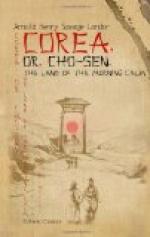by a nobleman! Such is the world even in Cho-sen.
The
Mapu will sing to you, and crack jokes,
and again will swear at you and your servants, and
at nearly every
Mapu that goes by. The
greater the gentleman his beast is carrying, the more
quarrelsome is he with everybody. The road, wide
though it be, seems to belong solely to him. He
is in constant trouble with citizens and the police,
and it is generally on account of his insignificance,
poverty, and ignorance that so many of his evil doings
and wrongs are forgiven. None the less it must
be said for them that they take fairly good care of
their minuscule quadrupeds. They feed them, usually
three times a day, with boiled chopped straw and beans,
and grass in summer-time, and with this diet you see
the little brutes, which are only about 10 hands high,
and even less sometimes, go twenty-five or thirty
miles a day quite easily, with a weight of a couple
of hundred pounds on their backs, quickly toddling
along without stopping, unless it be to administer
a sound kick to some bystander or to bite the legs
of the rider. These ponies have a funny little
way of getting from under you, if you ride them with
an English saddle. They bend their legs till
they see you firmly planted on the ground, and then
quickly withdraw backwards leaving you, with your
legs wide apart and standing like a fool, to meditate
on equine wickedness in the Realm of the Morning Calm.
They are indeed the trickiest little devils for their
size I have ever seen; and for viciousness and love
of fighting, I can recommend you to no steed more
capable of showing these qualities. The average
price of an animal as above described varies from
the large sum of five shillings to as much as thirty
shillings (at the rate of two shillings per Mexican
dollar), the price of course varying, as with us, according
to the breed, age, training, condition, &c., of the
animal.
These ponies are much used all over the kingdom, for
good roads for wheel traffic hardly exist in the country,
and wide horse-tracks form practically the whole means
of communication between the capital and the most
important ports and cities in the different provinces
of Corea. They are used both for riding purposes
and as pack-ponies, “for light articles only,”
like the racks in our railway carriages, but when heavy
loads are to be conveyed from one place to another,
especially over long distances, the frail pony is
discarded and replaced by the sturdy ox. These
horned carriers are pretty much of a size, and fashioned,
so far as I could see, after the style of our oxen,
except that they are apparently leaner by nature,
and almost always black or very dark grey in colour;
their horns, however, are rather short. They
carry huge weights on a wooden angular saddle which
is planted on their backs, and a Mapu invariably
accompanies each animal when loaded; indeed, in the
case of the ponies the man even carries on his own
back the food both for himself and for his beast,




